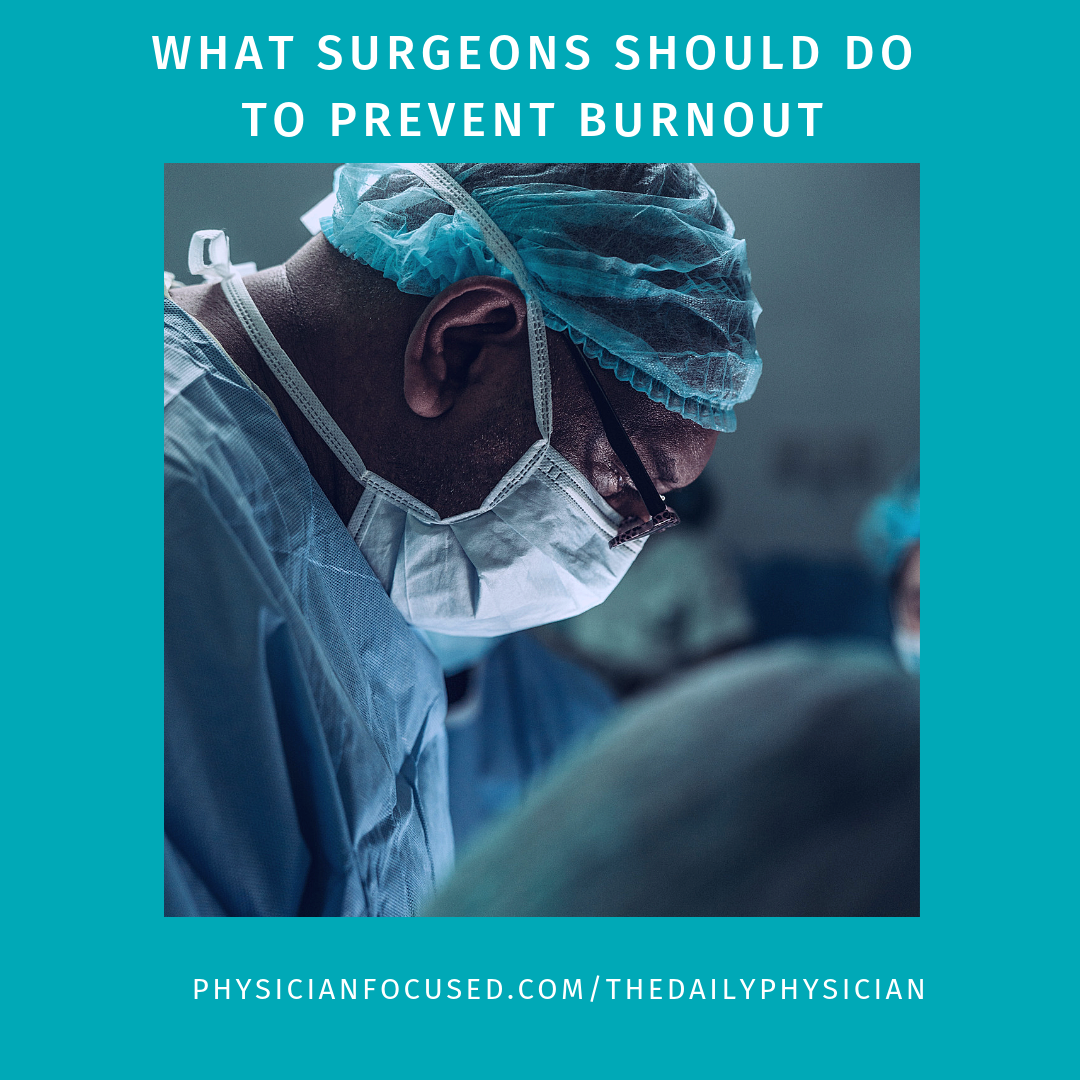
What surgeons should do to prevent burnout
The notion of physician burnout has been discussed in quiet circles for decades, but it is being discussed even more frequently among medical professionals at large and even in lay publications.
Whether it is due to the long hours, increased paperwork, or decreased patient contact, many physicians are admitting they are losing (or have lost) their passion for patient care. Surgeons are perhaps the highest risk for burnout and they often work in high stress situations, for longer shifts than their medicine colleagues.
Physician burnout rates have increased 8.42% over the last 5 years. In 2013, physician burnout was at 38%; in 2015, it was at a 45%, and in 2018, it was at 54.4%. That means over half of all practicing physicians in the United States are currently experiencing burnout. And, on top of that 41.7% of physicians have felt symptoms of depression.
Physician burnout is, according to some, is at epidemic levels. Others call it a crisis. Let’s just say, burnout among physicians is far too common. Doctors need help and the industry they work so hard for isn’t helping. With 20 hour shifts, patient care, online reputations to worry about, continuing medical education requirements, administrative duties and charting, we are just at the tip of the iceberg.
Surgeons specifically tend to be at the extreme end of the physician burnout scale with about 40% self-identifying as being burnt out. Not surprisingly, 30% of surgeons screened positive for depression and 28% had a mental quality of life score below the general population.1 These findings are reproducible for surgeons across the country. General surgeons often have to deal with life and death issues in high stress situations, and leaving these emotions “at the office” is easier said than done.
In addition, surgeons may feel the intense pressure to work long hours and operate even after extended overnight call all in the hopes of attempting to be financially productive. Surgeons also complain that the loss of autonomy, restriction on their clinical practice secondary to managed care, and increasing malpractice lawsuits weigh heavily on their minds. And again, these stressors add up; up to 15% of surgeons had considered committing suicide in the previous 12 months.
Unlike other specialties, a surgeon’s mistakes can immediately and drastically affect their patients, who are literally under the knife. It is in this setting that the question of work hours arises. Do the long hours affect surgeons such that they must be protected from themselves? From a public health standpoint, should we cap surgeon work hours to protect patients? How do we protect this specific and very important group of people?
Lessons from residency work hour restrictions
Much of the focus on work hours has come from the literature on residency work hours. Over the past several decades, work hours for physicians in training has decreased, secondary to concern about resident well being and patient safety.
The American Council for Graduate Medical Education (ACGME) residency work hour restrictions went into effect in 2011, and had a significant effect on the medical community’s view of acceptable physician work hours. The change decreased a call period to 16 hour call (from 24 hours) and limited resident work-hours to a maximum of 80 hours averaged over a four week period.2 While there has been a measurable decrease in the number of hours that residents work, the effect on patient safety, resident learning and wellbeing is less clear. Studies across the time periods have revealed contradictory results.2 Fewer hours may not make safer medical care or even happier residents. While the push towards residency hour restrictions seems to be done in good faith and in the interest of residents, it doesn’t seem to have the positive effect on capping surgeon hours that it had hoped.
What does the research show for surgeons?
While the evidence is clear, burnout exists in American surgeons and it is bordering on a crisis, the relationship between burnout and work hours is not always so clear cut. For example, research shows that major medical errors in surgery are strongly correlated with the surgeon’s self-described sense of burnout and mental quality of life.3 On the other hand, medical errors do not correlate with the frequency of overnight call or the number of hours worked.3 This would suggest that work hour caps applied to all surgeons would not necessarily reduce medical error. Instead, programs to identify and support struggling surgeons would perhaps be more effective. Programs and assistance to help physicians deal with long hours, burnout tendencies, and their personal lives may be the key.
What are the guidelines?
The American College of Surgeons (ACS) acknowledges that physicians are at increased risk of burnout, likely secondary to the same characteristics that led them to success as surgeons—a heightened sense of responsibility, perfectionism and commitment to their patients. Unfortunately, the ACS does not provide any easy answers to the question of physician work hours. Instead, they recognize that surgeons may be “conflicted and unable to make a rational evaluation” as they schedule surgery. Unlike other specialties, surgeons are likely to have been up all night on call and require some rest, but feel that this would be frowned upon by administration and would hurt their bottom line. The ACS suggests a coordinated approach to surgical sleep deprivation, but does not specify the details of this approach. Apparently the solution rests with individual hospitals a surgical practices (that are not incentivized to limit work hours).
So what should a busy surgeon do?
The ACS suggests relying on the professional community—talking to other surgeons, understanding that surgeons are not alone in feeling burnt out, and partnering with the Employee-Physician Assistance program at your hospital or group. Research indicates that efficient and supportive workplaces with hospital leaders who are empathetic and willing to make organizational changes are vital in improving physician wellness.
Surgeons, like all other working professionals, deserve an emphasis on work-life balance. An environment that purports there is no time or need for mental and physical well being can be detrimental to surgeons. There is already an increase in the already sizeable tension between time spent at work, quality time with one’s family and outside pursuits and passions. In fact, surgeons stress that work-life balance, the quality of their spousal relationship, and medical lawsuits are the three major stresses affecting their quality of life.1 This is information the medical community would do well to take notice of. Individual surgeons, and the surgical specialty as a whole, must resist the “culture of bravado” that suggests individuals must not complain or take personal time, but simply operate and be financially successful.1 Not only is this lifestyle unsustainable, the negative effects of this type of lifestyle are detrimental. In addition, hospital and employee leadership must work to address the problems of the reimbursement system, inadequate administration support, and the scheduling issues that plague surgeons. The importance of healthy surgeon mentors to counsel and guide younger surgeons cannot be overstated.
Here are some concrete steps to prevent burnout:1
- Periodically assess your balance—are you at a high, medium or low risk for burnout? Look at what things you are doing in your personal life to help combat burnout.
- Take personal responsibility and commit to practicing self-care habits
- Establish an outlet at work for stress such as a good mentor/support system
- Make use of physician assistance programs available in your institution or in subspecialty organizations
- Advocate for work-life balance in your institution
- Hire a personal assistant to handle the things on your to-do list. Let a professional handle the things in the back of your mind, while you get to focus on work.
It’s important to remember that you don’t have to manage it all by yourself, and you are not alone. There are people out there who want to help make your life easier so you can do what makes you happy.
While work hour caps are often used as a panacea for physician burnout, they are unlikely to be broadly helpful. Yes, they are a step in the right direction, but they aren’t the absolute cure. A holistic approach- that looks at number of hours worked as well as physician support and autonomy may be a better model to decrease physician burnout and improve the wellness of both surgeons and patients alike. Creating conversation around this topic and how we has a community can help doctors with burnout is another step in the right direction.
References
1. Balch CM, Shanafelt TS. Dynamic Tension between Success in a Surgical Career and Personal Wellness: How Can We Succeed in a Stressful Environment and a “Culture of Bravado”? Ann Surg Oncol. 2011;18(5):1213-1216. doi:10.1245/s10434-011-1629-z
2. Philibert I. What Is Known: Examining the Empirical Literature in Resident Work Hours Using 30 Influential Articles. J Grad Med Educ. 2016;8(5):795-805. doi:10.4300/JGME-D-16-00642.1
3. Shanafelt TD, Balch CM, Bechamps G, et al. Burnout and Medical Errors among American Surgeons. Ann Surg. 2010;251(6):995-1000. doi:10.1097/SLA.0b013e3181bfdab3


